CJC-F, CJC-F Announcements, CJC-F Understanding Forensics, CLD Criminal Law Basics
INTRODUCTION
News reports of persons being arrested for a variety of drug offences are still common despite Singapore’s strict drug laws. Such offences include possession, consumption and trafficking of controlled drugs and substances. Sometimes, the sentences imposed by the Courts are also provided in the news report if said persons were convicted of the offences. So, you may wonder, why do some accused persons receive vastly different punishments from one another? For example, why would an accused person be sentenced to death if he was in possession of 20g of heroin but he would not if it was 20g of cannabis instead?
The reason for this is lies in the rules and limits found in the Misuse of Drugs Act (“MDA”). The MDA sets out the different drug offences that exist in Singapore and the sentence that should be imposed in accordance with the type of drug the accused person possessed.
This article aims to introduce the offences in the MDA and the relevant sentence that an individual may receive should they be found with an illicit substance.
Note that this article is written with reference to the newest version of the Misuse of Drugs Act, which includes the amendments made to it by virtue of the Misuse of Drugs (Amendment) Act 2019.
SCOPE OF THE ARTICLE
The following four basic offences will be addressed:
Possession of a Controlled Drug
Consumption of a Controlled Drug
Trafficking of a Controlled Drug
Importation and Exportation of a Controlled Drug
There are other offences in the MDA, such as the cultivation of cannabis or the abetment of any of the offences, but those offences will not be addressed in this article.
DIFFERENT CLASSES OF DRUGS
Before addressing the different drug offences, it is worth reiterating that there are countless different drugs in the world. For the purposes of conviction and sentencing, the MDA has divided the different types of drugs into Class A, Class B and Class C drugs. Different classes of drugs are subject to different possible sentences. For example, the table below illustrates how the punishment varies for trafficking different classes of drugs.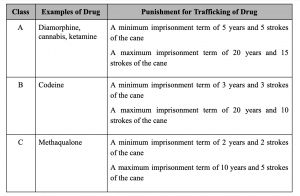
Given how vastly different the possible sentence may be according to the type of drug, the identification of the drug an accused person is found in possession of becomes extremely important. The different laboratory techniques used to identify different drugs will be discussed in subsequent articles.
POSSESSION
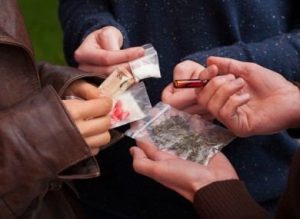
Source: https://www.thejournal.ie/personal-drug-possession-poll-4753702-Aug2019/
1. Offence
The first offence is the of possession of a controlled drug or substance, as set out in Section 8(a) of the MDA and states as follows:
“Except as authorised by this Act, it shall be an offence for a person to have in his possession a controlled drug…”
2. Sentence
The sentence imposed on the offender is dependent on the type of drug found in the offender’s possession and the amount of said drug. Generally, if this was the offender’s second or subsequent offence, he may be sentenced to a minimum term of 2 years imprisonment, whereas the maximum term of imprisonment would be a term of 10 years’ imprisonment or a fine of S$20,000.00 or both.
At this juncture, it is prudent to note that the sentence imposed for cases of possession is usually dependent on the weight of the drug that was in the offender’s possession. This is addressed further below in the trafficking section.
3. Presumptions
The rules of possession seem quite simple as first glance as the individual only needs to be in possession of it. However, one also needs to look at the presumptions that exist in the MDA. These presumptions either (1) attribute possession of the drug to the individual, even though the individual may not be in physical possession of the drug itself (such as the drug being in his pocket), or (2) result in the offence becoming one of trafficking.
The presumption concerning trafficking will be addressed below in the relevant section.
The presumptions which would attribute possession to an individual are summarised as follows:
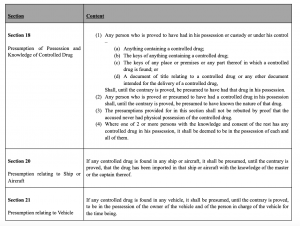
As shown, an individual does not have to actually be holding onto the drugs itself to be deemed to be in possession of it. It is sufficient if the drugs were in the car of the person or if they were in a bag which he had thrown away. This may seem, at first glance, to be rather harsh. However, it should be noted that this is only a presumption that the drugs are in their possession. This means that if the individual can show that they did not have knowledge of the existence of the drugs, the presumption is rebutted and they will not be guilty of an offence of possession.
CONSUMPTION

Source: https://encrypted-tbn0.gstatic.com/images?q=tbn:ANd9GcRjWo6zWy254IDvowSFzpOD0CH_rfHhn4UmBw&usqp=CAU
1. Offence
The next offence is the consumption of a controlled drug as set out in Section 8(b) of the MDA and reproduced as follows:
“Except as authorised by this Act, it shall be an offence for a person to smoke, administer to himself or otherwise consume a controlled drug, other than a specified drug; or a specified drug”.
Put simply, it is an offence for an individual to consume a controlled drug or specified drug. This would include drugs such as cannabis or heroin.
Another important thing to note is that this same section, and ultimately the same rules, apply even if an individual had consumed a drug overseas. Section 8A of the MDA section sets out how a Singapore citizen could still be charged with an offence, even though he committed the offence overseas. Note that this still applies even though it may be legal to consume the drug overseas. For example, it is legal to consume cannabis in some states in the United States. That act still does not exempt you from being convicted of a consumption charge here despite having consumed said cannabis in a country where it is legal.
2. Presumptions
Just like for possession, the offence of consumption is also subject to certain presumptions:
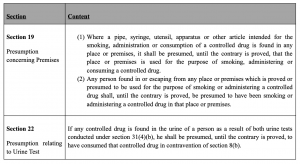
The above presumptions can be rebutted with proof of the contrary. For example, some legal medicines, when consumed, may result in a reaction in the body similar to drugs like methamphetamine. This is why you are usually required to declare whether you are on any medication before any urine tests – in case there is a false positive.
3. Sentence
The starting point for consideration of the sentence to be imposed for consumption cases is imprisonment of a minimum of one year to a maximum of 10 years, set out in Section 33(3A) of the MDA, reproduced as follows:
“Any person convicted of an offence under section 8(b), 31(2) or 31A(2) that is committed on or after the date of commencement of section 16 of the Misuse of Drugs (Amendment) Act 2019 shall on conviction be punished with imprisonment for a term of not less than one year but not more than 10 years and shall also be liable to a fine not exceeding $20,000, unless the person is punished under subsection (4), (4AA) or (4AB) or section 33(A) (as the case may be) for that same offence.”
As evinced from the aforementioned section, the position of sentencing is dependent on whether the person is punished under other subsections of Section 33. This includes factors such as prior convictions of similar offence, the failure to provide a specimen of urine for a urine test and previous admission in a drug rehabilitation institution.
Hence, it can be said that the sentence to be imposed on a drug offender is dependent on the prior record of the said offender.
TRAFFICKING
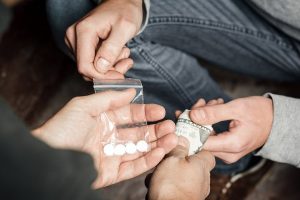
Source: https://www.footprintsbeachside.com/blog/drug-trafficking-addiction-in-florida/
1. Offence
The third offence is that of trafficking of controlled drugs, which is set out in Section 5 of the MDA and reproduced as follows:
(1) Except as authorised by this act, it shall be an offence for a person, on his own behalf or on behalf of any other person, whether or not that other person is in Singapore –
(a) To traffic in a controlled drug;
(b) To offer to traffic in a controlled drug; or
(c) To do or offer to do any act preparatory to or for the purpose of trafficking in a controlled drug.
(2) For the purposes of this Act, a person commits the offence of trafficking in a controlled drug if he has in his possession that drug for the purpose of trafficking.
The term ‘traffic’ is also defined in Section 2 of the MDA to mean:
(a) To sell, give, administer, transport, send, deliver or distribute; or
(b) To offer to do anything mentioned in paragraph (a)
Otherwise than under the authority of this act, and “trafficking” has a corresponding meaning.
From the aforementioned definition, the scope as to what constitutes ‘trafficking’ is rather large. This essentially means that if Person A carries a packet of heroin from his house to Person B’s house, it is technically trafficking as he is transporting or delivering said packet to Person B’s house.
Apart from fulfilling one of the acts of trafficking set out in Section 2 above, an accused person may also be charged with trafficking if they are in possession of an amount of that particular drug that is above a particular threshold. This is as set out in Section 17 of the MDA which specifies the minimum statutory thresholds that, if crossed, would mean that a person is found to be in possession of the drugs for the purposes of trafficking. If the amounts are crossed, it is presumed that the individual is in possession of the drugs for the purposes of trafficking.
For the avoidance of doubt, if the individual is in possession of an amount of the drug which is less than the amount set out in Section 17, then he would only be considered to be in possession of said drug, unless he is actually trafficking it, as per the Section 2 definition.
2. Sentence
For sentencing in trafficking cases, the weight of the drug is paramount. Once the weight of the drug is found to be above a certain weight threshold, the individual may be sentenced to death. The table below sets out the different statutory limits that the MDA has placed on certain drugs. These drugs are those specifically flagged out in the MDA to have their own specific limit, which if crossed, converts the offence of possession to that of trafficking.
If the amount being trafficked is within a particular range, as set out below, the accused person would be subject to a sentence in the sentencing range of the statutory minimum of 20 years’ imprisonment, and 15 strokes of the cane, and the statutory maximum of 30 years or life imprisonment, along with 15 strokes of the cane.
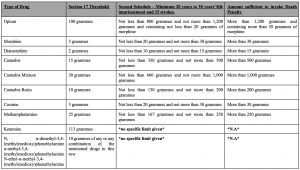
IMPORTATION AND EXPORTATION OF A CONTROLLED DRUG

Source: https://www.europol.europa.eu/newsroom/news/international-drug-trafficking-network-disrupted
1. Offence
The last offence to be addressed presently is that of importation and exportation of controlled drugs. This is as set out in Section 7 MDA which states:
“Except as authorised by this Act, it shall be an offence for a person to import into or export from Singapore a controlled drug.”
The offence is made out if an individual brings drugs in or out of the country. For the avoidance of doubt, the individual must have had knowledge of the drugs.
2. Sentence
The sentence is dependent on the weight of the drugs that were being imported or exported. Offences of importation and exportation are generally deemed to be more serious than that of trafficking, and this is reflected in the Second Schedule of the MDA which provides that the general maximum imprisonment term is that of 30 years. Note that the death penalty may also be imposed if the amount of drugs involved in the charge is higher than the threshold set out in the MDA.
The general sentencing ranges for offences of importation or exportation differs depending on the class of drug being imported or exported, and is as follows:
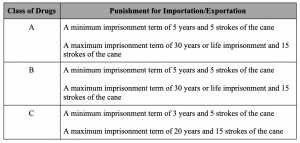
The vast difference in the general sentencing ranges between trafficking and importation shows how such offences of importation and exportation are seen as more serious offences than that of trafficking.
The table below summarises the basic sentences that will be imposed for the offences of importation or exportation of certain drugs: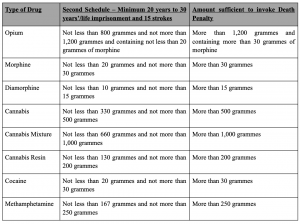
CONCLUSION
Apart from the above mentioned offences of possession, consumption, trafficking and importation/exportation of drugs, there are far more offences in the MDA which are beyond the scope of this article. This article seeks to help readers understand the basic drug laws that exist in Singapore.
*The views and opinions expressed in this article do not constitute legal advice and solely belong to the author and do not reflect the opinions and beliefs of the NUS Criminal Justice Club or its affiliates.
AUTHORS’ BIOGRAPHY
Mohamed Sarhan is a Year 3 Law Student in NUS Law and is one of the Project Managers of “Drugs & Forensics”. He is in charge of facilitating the activities within the project and hopes to evolve the project to a greater stage. Though still a student, Sarhan has assisted in a variety of criminal law cases and wants to use his knowledge to educate others about drug laws in Singapore. He hopes that his efforts in the project will enlighten others about the law’s position on drugs and the plight of drug offenders.
Muhammad Khairul Fikri is a Year 3 undergraduate from the Faculty of Arts and Social Sciences. Khai is one of the Project Managers of “Drugs & Forensics”. He is pursuing a Major in Geography and two Minors; Forensic Science and Geographical Information Systems. He is interested in the applications of technology, particularly geospatial technologies, in forensic science and crime scene investigations.

